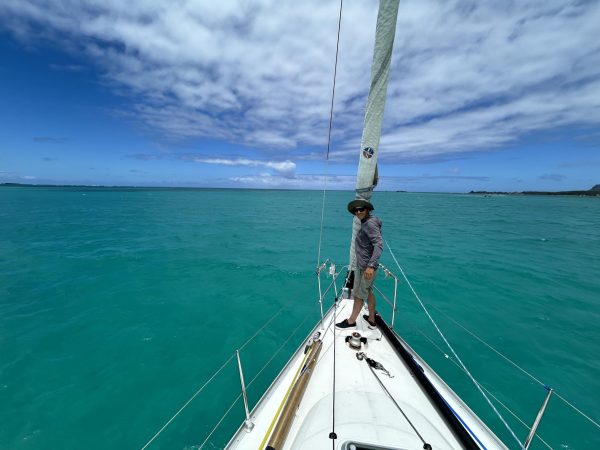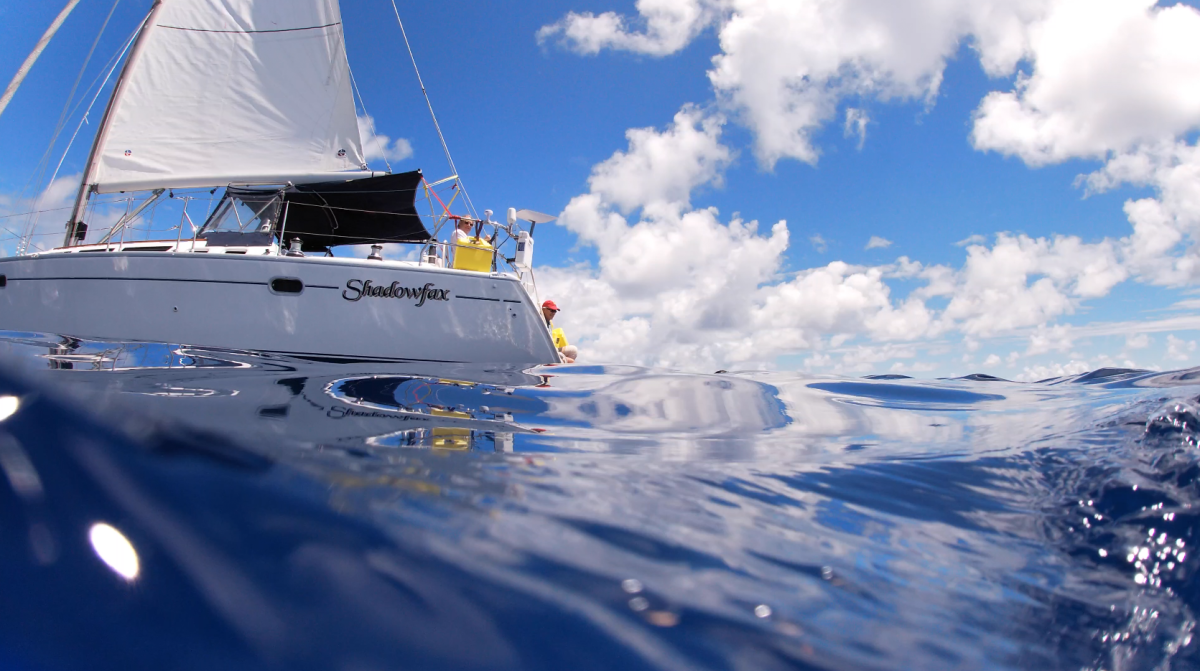Henry Fliflet, 19, is a second-year Santa Rosa Junior College student who had the ultimate grand finale to his summer break this year. According to the Pacific Cup, he successfully crewed a boat approximately 2,070 nautical miles across the Pacific Ocean. For total transparency, Fliflet is a staff writer for The Oak Leaf.
Fliflet and four other crewmen debarked from the boat Shadowfax, named after a renowned horse from the Lord of The Rings Franchise, this August after an 18-day trek from Oahu to Long Beach. This journey, known as a delivery in the sailing community, helped reposition the boat after the Pacific Cup races. The race began in California in July and ended in Oahu in August.
Fliflet was homeschooled K-12, which gave him the opportunity to develop many creative skills. As a child, he appreciated writing and classic novels, most fascinated by the 1930s series Swallows and Amazons. “It’s about these kids who have this sailing boat and they just kind of have these adventures on this lake [in] England. It captured my imagination, and I’ve been interested in it, pursuing it, ever since,” Fliflet said.
He started sailing locally at Lake Ralphine, a 25-acre lake on the east side of Santa Rosa open to boating and fishing. As a young teen, he took a week-long course to try something new and was immediately hooked. He bought himself a starter dinghy and worked his way up.
His current boat, the Leonna Annie, is a 26-foot 1975 International Folkboat. Fliflet explained that his boat is a fiberglass interpretation of a 1930s Swedish sailboat. He finds it very user-friendly. Fliflet usually likes to take his boat out of the San Rafael Marina, but he found himself looking for something more challenging this summer.
“Last Spring, in a fit of malaise about what I was doing with my life, I thought, ‘Ah!’ I’m gonna just make a crew listing on the Pacific Cup website,” Fliflet said. He knew he was too “green” to compete officially in the Pacific Cup Race, but he hoped to sail a boat back after the races.
He ran into a few roadblocks as he made his way towards Hawai’i, where the Pacific Cup Race finish line is. His original plan fell through when the sailboat he intended to crew back to California was set to remain in Hawaii for the winter. A sailing buddy of his connected Fliflet to another Skipper, Steve George, who was looking for crew to help get his boat Shadowfax back to Long Beach. Fliflet was elated at this news. Two days after an interview with Steve, he was flying to Oahu!
Once he arrived, the work had just begun. Fliflet was responsible for collecting supplies, including crucial fuel for the boat. He traveled all across Oahu collecting fuel canisters in a large truck, which amused him. “So the lead-up was insane, and the experience is just incredible,” Fliflet said.

They set off on their 18-day journey with all their supplies in tow. Fliflet noted how difficult the first couple of days were. He was in new territory and had to learn on the fly. As anyone would imagine, a journey like this is a tough transition.
One of Fliflet’s crewmates, Colin, 26, who chose to keep his last name private, was elated to see someone in the same age bracket as him in Oahu before departing. As the resident ‘youngster’ on the boat, Colin found Fliflet’s presence refreshing.
Colin is a Southern California-based student, teacher assistant and avid sailor. He focuses on nautical science and is a steward for ocean conservation. He was looking forward to showing Fliflet the ropes during their trek.
Once on water, the schedule was drastic compared to life on land. The crew worked in teams, two hours on, three hours off. Colin said, “We didn’t sleep more than two and a half hours at best, which is something quite interesting for the human mind to go through. But it’s surprisingly not too difficult to make that adjustment.”
Fliflet expanded on his trouble with the new routine. He found the day-to-day life onboard challenging at first because the days were unending. Instead of sleeping away the difficult day and starting fresh in the morning, they would return to it a few hours later.
Gear failures were also a concern, the water maker and charging systems were on the fritz and they almost lost the mast. For reference, the mast is the tall post that stands straight up, holding the sailboat’s sails upright – a cornerstone of any sailboat.
To top it off, their trek ended with some nasty storms. Colin said, “And these waves, they were big, they were 10 to 15 feet at times. So some of these waves are literally towering over you from behind.” Colin put his fears aside when driving the boat during the storm, but he reminisced that it was a more serious part of their journey.
Fliflet also conveyed the seriousness of this journey when he said, “The highs were incredibly high, and the lows were just soul-crushing. It’s kind of a weird feeling. If you want off, there’s no off. You’re stuck on the boat until the passage is over.”
Fliflet was an integral part of the crew. Colin was amused at times at how Fliflet was a calming presence — something very important when out in the middle of the Pacific Ocean.
“When things were kind of going wrong, at times, you would look at Henry, and he’s just like, reading his book or something, and it’s just like, everything’s calm. We’re fine, you know?” Colin said.
Even with the massive challenges, both men saw the beauty of what they were a part of. They independently discussed how vast they felt nature was during their trek.
Colin noted that being awake at all different hours of the day and night made him feel connected with the “celestial bodies” above him. Fliflet reminisced about swimming in waters roughly 13,000 feet deep on a calm day. He said, “It was totally freaky. But just kind of a fantastic feeling of just the immensity of nature and the ocean.”
Fliflet found this first delivery of his to be extremely meaningful, and he’d like to embark on a similar journey in the near future. He’s hoping to sail across the entirety of the Pacific, on a bigger boat of course.
Colin was glad to help guide Fliflet as he tries to build up the next generation of ocean stewards.
“The [Earth] is covered 70% with water, and our land experience is so alien to what’s happening out there. Part of what’s going on with our planet is a lack of connection with our environment, with nature,” Colin said. “Most people don’t know how to sail, have no interest in sailing, it’s a huge portion of the world that they’re not capable of experiencing.”






suzan brooks • Dec 15, 2024 at 8:33 pm
You guys were amazing ! The happy future to sailing!